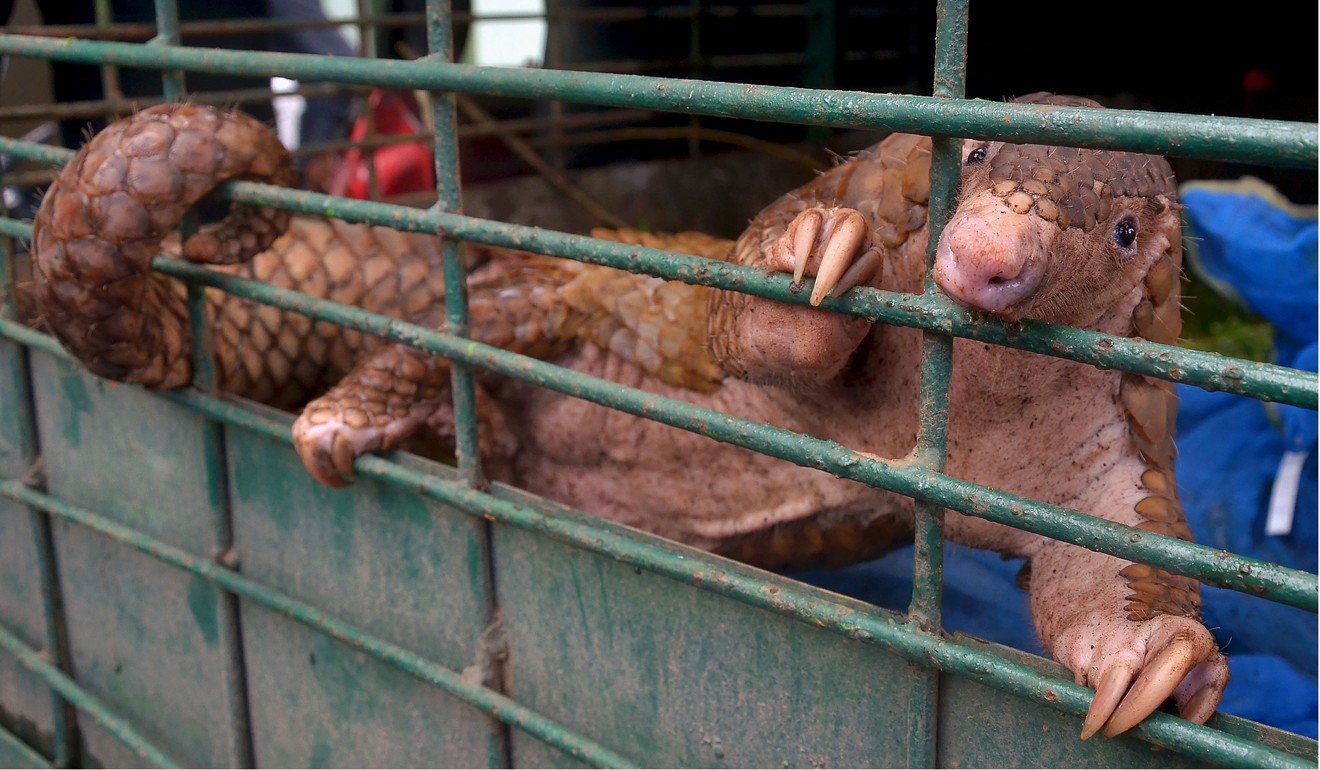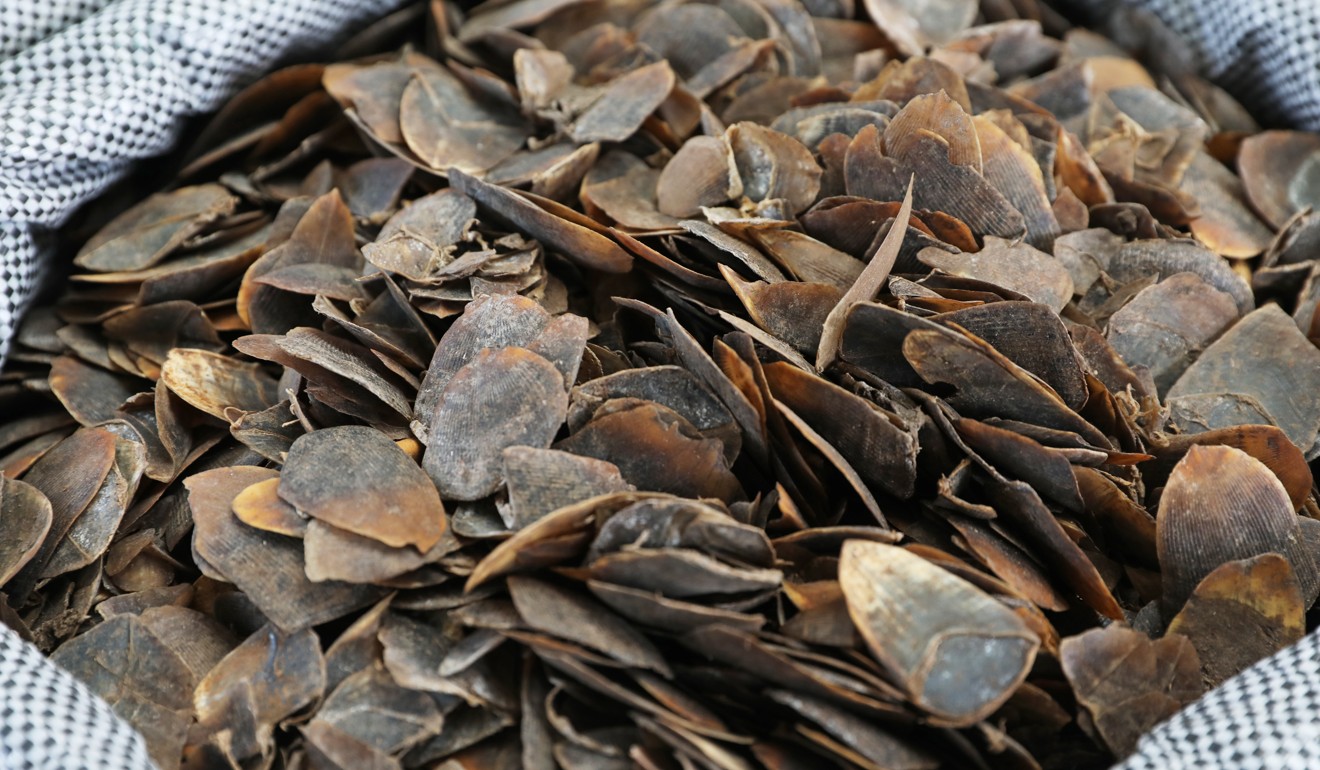
Consider alternatives to pangolin scales, traditional Chinese medicine professors urge at conservation conference in Hong Kong
HKU academic warns that illegal vendors exaggerate the effectiveness of the scales for treating various conditions
There are alternatives to pangolin scales that have similar medicinal qualities, Chinese medicine professors said, urging the public not to believe the exaggerated effects touted by illegal vendors.
Their call, made at an international conservation conference on Wednesday, came as the Post reported that the amount seized in the first seven months of this year had reached a five-year high, with most of the contraband being sourced from Africa.
At the event, traditional Chinese medicine academics, pangolin experts and conservationists from mainland China, Hong Kong, Singapore, Vietnam and Africa gathered at the University of Hong Kong to discuss how to protect the highly trafficked mammals.
The scales, comprising mainly keratin and believed to have high medicinal value, were found to be a major reason behind the poaching of the animals, whose meat is also seen as a delicacy. There is no scientific evidence showing that pangolin scales are effective as a treatment.
Pangolin scales found for sale on Pinduoduo
“Many herbal medicines have very similar functions to pangolin scales,” said Professor Lao Lixing, director of HKU’s School of Chinese Medicine, during the conference organised by international conservation group WildAid.
According to Lao, in Chinese medicine, it usually takes between five and nine grams of processed scales per dose, along with supplementary materials, to treat conditions such as breast milk stoppage, rheumatoid arthritis, sores and furuncles.
He explained that the industry often associated the medical qualities of an ingredient with the animal’s behaviour.
“[Pangolins] can go through the soil, so it’s believed that [their scales] can go through the vessels,” Lao said, referring to the meridian system, through which life energy flows in traditional Chinese medicine.

Lao listed six substitutes including cowherb seeds, known in Chinese as wang bu liu xing, which could be used for promoting milk secretion. Earthworms, known as di long, can also dispel “heatiness” and expel wind from the body.
“There are so many [substitutes] if you look at the textbook of Chinese medicine. I just named a few here,” he said.
Lao called on the Chinese government to educate the public about the medical properties of pangolin scales, as he feared that some people might think the products must be effective if they were banned. The effects were often exaggerated by illegal vendors, he said.
How ‘heaty’ and ‘cooling’ made it to the Oxford dictionary
Dr Feng Yibin, associate director at the same school, said the institution’s teachers always made it clear to students that the species were endangered and should not be used, although students were told about their medicinal value.
On the mainland, raw pangolin scales can be obtained only at designated hospitals and from approved pharmaceutical companies, while legally sold processed scales must display a special label issued by the government.
The Chinese government has supported captive breeding as a solution by granting approval to some companies to raise pangolins. International experts at in the conference however questioned the feasibility of this approach.

Dr Helen Nash, vice-chairwoman of the pangolin specialist group under the International Union for Conservation of Nature Species Survival Commission, cited an IUCN study stating that pangolin farming was not financially viable and that many animals had died in captivity.
Nash said that although the success rate of raising pangolins in captivity was a lot higher than it used to be, the cost of doing so – about US$7,000 – could not be covered by the animal’s market value. She added that zoos in Singapore and Taipei had tried for decades to raise pangolins but only managed to raise a handful. There was currently no commercial data for assessment, she said.
WildAid CEO Peter Knights voiced concern that commercial farming would become an excuse for encouraging the wildlife trade as it was too expensive, slow and suffered from very high mortality.
Loophole sees pangolin scales on sale in Hong Kong
Dr Sun Quanhui, a senior scientific adviser from World Animal Protection, cited a 2010 survey that found most consumers were willing to buy wild bear bile at a higher price despite being given three alternatives, including bile from farmed bears.
He added that using wildlife would be an obstacle to Chinese medicine going global as it left a negative impression and would face restrictions imposed by international players.
According to WildAid, Chinese pangolins have disappeared from most of their habitats, with their population having fallen by more than 94 per cent since the 1960s. The demand then shifted towards the neighbouring Sunda pangolin, which in turn suffered an 80 per cent decline over the last 21 years.
